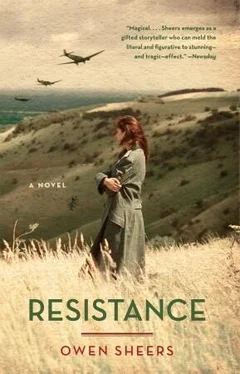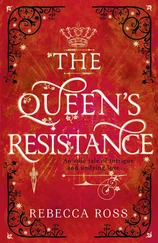Sarah looked into the fire. Maggie was jumping ahead again, as if she knew what their husbands were doing, where they were. “But William an’ the rest,” she said, still staring into the flames, “we don’t know what they’re doing. I mean, that book, we don’t …”
“We don’t know nothing, bach,” Maggie interrupted, her face set hard again, “we don’t know nothing about anything. But he does, see. He does. They got a radio, haven’t they?” Her face softened, sagging under her age and the weight of the moment. “So he knows. He knows what’s going on out there, and believe me, bach, you don’t want to hear the half of it.”
Over the rest of that winter, the longest and harshest any of them had ever known, the women’s lives in the valley resembled one of the landscape watercolours Sarah used to watch the poet paint down by the two streams of the old monastery. They were the same as they’d always been and yet were also entirely different; recognisable as their lives, but dramatically altered at the edges. Their days existed of well-worn routines of feeding, fixing, cutting, making, all turning around many of the same concerns and chores they always had. And yet each day was also another unreal awakening into a world they didn’t know.
Over the weeks following Albrecht’s visit to Maggie, the patrol managed to gather the rest of The Court’s flock from the other farms, although many were lost up on the higher reaches of the hills. With this source of fresh meat along with the provisions they’d found in the house and their own dwindling supplies, they remained self-sufficient within the valley. Now and then they assisted the women, trying to keep certain pathways and tracks clear, drying and cutting wood when stocks became low. Alex regularly helped Maggie with the feeding and handling of her cob mare and foal and sometimes with the early milking of her cows, the only source of milk in the valley. In return she’d let him take back a jug of fresh milk, which he’d have boiling on the range in The Court as the others began to wake. Gernot took on the cooking responsibilities while, under Alex’s guidance, Steiner helped manage the flock. Sebald began to take an interest in the vegetable garden, carefully clearing the blanket of snow and tipping hot water over the frozen soil to uproot the parsnips and carrots, hard as steel. Otto helped Edith move down to Maggie’s, clearing a path from The Gaer and then carrying her battered leather case behind her as she slowly picked her way down the hill muffled against the cold with one of Roderick’s old jumpers wrapped about her head.
The women, meanwhile, all found their own ways of coping with the isolation, fear, and missing their husbands. Mary increasingly found solace in the Bible, reading and rereading the Book of Job. She took it upon herself to fill the vacuum left by the absence of Reverend Davies, reading to the others in a voice not her own when they came to her front room on a Sunday: “Naked came I out of my mother’s womb, and naked shall I return hither: the Lord gave, and the Lord hath taken away; blessed be the Lord.” She focused her worries where she could see them, on Bethan, rather than upon Hywel or her sons, both of whom she’d had no word of since the invasion.
Bethan herself kept up a sullen doggedness, spending most of her time helping Menna with her two children. She missed her father badly and mistook her mother’s distractions as a lack of love for her husband. She was painfully aware of her youth, precious and wasting inside her, and felt increasingly suffocated by the other women, by the whining and crying of Menna’s two children. Before the winter she’d found some rare moments of solitude riding her pony through the sheep tracks up on the hills. The snow had put a stop to that, and now, on the rare occasions when she could sneak away from her mother and Menna, she crossed the valley instead, walking beside the hedges to hide her tracks, and climbed the facing slope, skirting around to higher ground above The Court. From here, crouching behind a thorn tree, she’d spy on the Germans. When she saw one of them, either through The Court’s large back windows or when they came outside, she’d try out curses under her breath: “Fritz bastard, Nazi scum, fucking fascists,” and once even the old-fashioned “dirty Hun” she’d heard her father mutter when listening to reports of the bombing of Swansea on Maggie’s radio. None of her curses was charged with real venom, and by the third or fourth time she’d crouched behind the thorn tree they had faded to a half-silent instinctive chant, dislocated from any meaning and increasingly obscured by her growing fascination with these men, some of them young, as young as her perhaps, who washed, talked, pissed, and yawned below her. One of them, particularly, had begun to draw her attention beyond mere curiosity or interest. There was something about his laugh, so natural, so open, that it seemed to belong to another time, long before this war. Bethan felt herself lighten every time she heard it, and she often waited until she’d caught a glimpse of Gernot before making her way back to the other side of the valley.
Maggie worked on, faithful to the two standards of her new existence: to continue as they always had and to keep the other women in the valley alive, both physically and mentally. She missed William more each day and saw him in every nook and corner of the farm they’d shared for over thirty years. She saw him in the loose slates he’d never fixed, in the snow collected like piled white books on the iron cleats of the silent tractor, in the space on the dresser where his pipe and folded pocketknife once lay, waiting for his return from the field at the end of the day. She saw him most of all, though, in the young colt, not yet a year old, they’d foaled together at the end of last summer.
Maggie never spoke of the depth of her grief to any of the others, and she only ever spoke to William when she was alone with the mare and her foal in the cramped stable in the corner of the yard. Standing in the warmth of this stable, icicles hanging from the guttering above the half-door, she’d stroke the foal’s new mane as his mother pulled and chewed from the rack of fresh hay.
“Comin’ up lovely, isn’t he, Will?” she’d say under her breath as she ran her hand over the swirls of hair above the colt’s shoulders. “Going to be a beaut, mun. A good colt for us, Will. Imagine that, eh? Running a yearlin’ like this come the summer.”
And it was only then, when she thought of the days and seasons to come that she would have to endure without her husband, that Maggie cried. Silently and to herself while the mare tore at the hay and the colt nuzzled her pocket for a treat of oats, she shed private tears. For all the years they’d lived together, for the sons they’d raised, for the son they’d lost, and for the way their shared lives had been extinguished overnight, so suddenly and certainly by a faraway war that had only now, at the very end, come calling at their door.
Sarah did not cry to herself like Maggie because, unlike the older woman, Sarah still believed. She believed that even if what “The Countryman’s Diary” suggested was true, the men were still coming back, one day. This is why, of all the women, Sarah resisted the assistance of the patrol the most. Since the morning of the first snowfall, she’d been especially wary of Albrecht and wanted no more contact with him and his men than was absolutely necessary. Once they’d helped her clear a path down to her lower fields, she’d had little need of any further help anyway. But even if she had, she’d rather have coped on her own despite the harshness of the winter, which became so cold she often couldn’t go into the parts of Upper Blaen unreached by the warmth of the fire without layering herself with her and Tom’s coats. Every morning she woke with a headache brought on by the bitter nights, and she spent two whole afternoons filling the gaps in the larder wall with mud, scraped up from down by the stream below. It was too late for most of the vegetables stored there. The potatoes had blackened in the frost and when she sliced an onion its layers were seamed with crystals of ice. She sunk into routine, hibernating the parts of herself unnecessary for the day-to-day survival of her mind and body. She worked hard, fixing, mending, and feeding as best she could the chickens, the pig, the sheep. Every day she threw Bess larger armfuls of hay than she should, determined to reverse the shedding of the pony’s flesh that had left her ribs showing sharper each morning through her ragged coat. In this way Sarah kept up a solid resistance to the siege of snow and ice that pressed upon her as if to drown her, as it had already a third of her flock. In between her chores she wrote to Tom in the back of their accounts book, held their wedding photograph trying to remember, and in her evenings alone, when she felt she could spare the oil and wicks for the lamp, she read, either from the Bible or from the few books that Mrs. Thomas had given her when she left school: The Mill on the Floss, Jane Eyre, Great Expectations, The Mayor of Casterbridge .
Читать дальше












